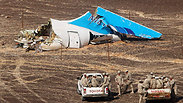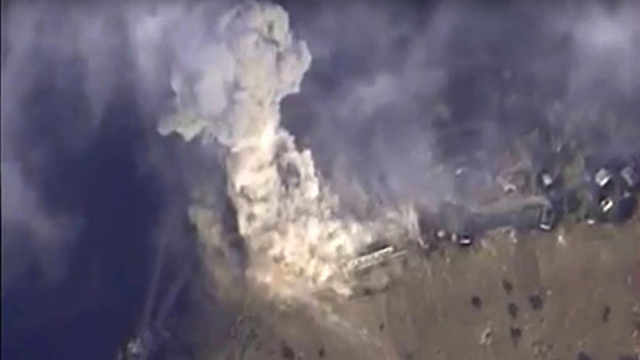
Israeli intelligence intercepts were reportedly being used by American and British intelligence agencies in order to assess the fate of the Russian jetliner that crashed in the Sinai Peninsula last week, CNN reported on Sunday.
The report quoted a US official briefed on the intelligence, as well as a diplomatic source, who told the TV network that Israeli intelligence officials provided American and British intelligence agencies with intercepted communications between Islamic State terrorists about the crash.
Israeli sources refused to comment on the matter to CNN.
The Egyptian team investigating the crash told Reuters on Sunday they were "90 percent sure" the noise heard in the final second of a cockpit recording was an explosion caused by a bomb.
"The indications and analysis so far of the sound on the black box indicate it was a bomb," said the Egyptian investigation team member. "We are 90 percent sure it was a bomb."
The Airbus A321 crashed 23 minutes after taking off from the Sharm al-Sheikh tourist resort eight days ago, killing all 224 passengers and crew, including 214 Russian nationals and three Ukrainians. Russian President Vladimir Putin has declared November 1 a national day of mourning immediately following the crash.
The Islamic State claimed that its local affiliate in Sinai had succeeded in downing the aircraft, according to supporters on Twitter and the Aamaq website, which acts as a semi-official news agency for ISIS. According to the report, the organization said it did so in revenge for Russian airstrikes in Syria.
"Russians and everyone who is with you in the alliance: Know that you are not safe on Muslim soil or in Muslim airspace," read a statement attributed to ISIS. "The daily murdering of dozens in Syria by your airstrikes will bring disaster on you. Just as you kill, so you will be killed, God willing."
If the group was responsible, it would have carried out one of the highest profile killings since al Qaeda flew passenger planes into New York's World Trade Center in September 2001.
However, an Egyptian aviation official said the pilot had reported technical difficulties before losing contact with air traffic controllers. Ayman al-Muqadem, a member of the Aviation Incidents Committee, said the pilot had reported his intention to attempt to land at the nearest airport.
Lead investigator Ayman al-Muqaddam announced on Saturday that the plane appeared to have broken up in mid-air while it was being flown on auto-pilot, and that a noise had been heard in the last second of the cockpit recording. But he said it was too soon to draw conclusions about why the plane crashed.
The current hypothesis is that a bomb was planted on the aircraft ahead of its takeoff from Sharm El Sheikh Airport.
Asked to explain the remaining 10 percent margin of doubt, the investigator declined to elaborate, but Muqaddam cited other possibilities on Saturday including a fuel explosion, metal fatigue in the plane or lithium batteries overheating.
He said debris was scattered over a 13-km (8-mile) area "which is consistent with an in-flight break-up".
'Game changer'
Confirmation that militants brought down the airliner could have a devastating impact on Egypt's lucrative tourist industry, which has suffered from years of political turmoil and was hit last week when Russia, Turkey and several European countries suspended flights to Sharm al-Sheikh and other destinations.
"What happened in Sharm al-Sheikh last week, and to a lesser extent with the ... (Germanwings) aircraft, are game changers for our industry," Emirates Airlines President Tim Clark said, referring to the crash of a Germanwings airliner in the French Alps in March, believed crashed deliberately by its co-pilot.
"They have to be addressed at industry level because no doubt the countries -- US, Europe -- I would think will make some fairly stringent, draconian demands on the way aviation works with security," he said at the Dubai Airshow.
Clark said he had ordered a security review but was not suspending any flights as a result of the disaster. Emirates does not operate regular flights to Sharm al-Sheikh.
British Foreign Secretary Philip Hammond also said the incident could lead to changes in flight security.
"If this turns out to be a device planted by an ISIL operative or by somebody inspired by ISIL, then clearly we will have to look again at the level of security we expect to see in airports in areas where ISIL is active," Hammond told the BBC.
Islamic State, which wants to establish a caliphate in the Middle East, is also called ISIS or ISIL.
Russia has returned 11,000 of its tourists from Egypt in the last 24 hours, RIA news agency said on Sunday, a fraction of the 80,000 Russians who were stranded by the Kremlin's decision on Friday to halt all flights to Egypt.
In St Petersburg, where the flight was headed on Oct. 31, the bell of St Isaac's Cathedral rang 224 times and a service was held in memory of the victims.
Russia has sent specialists to conduct a safety audit of Egypt's airports and to provide recommendations on additional measures, Arkady Dvorkovich, deputy prime minister, was quoted as saying by Russian agencies.
Dvorkovich, the head of a government group created on Friday to deal with suspended flights to Egypt, added a second group was going to Egypt on Sunday and a third would be sent later.
Britain, which has 3,000 nationals waiting to return home, has sent a team of 70 people, including 10 aviation specialists working at Sharm al-Sheikh airport to make sure security measures are being followed.
Eight flights were expected to take British tourists back home on Sunday.

















